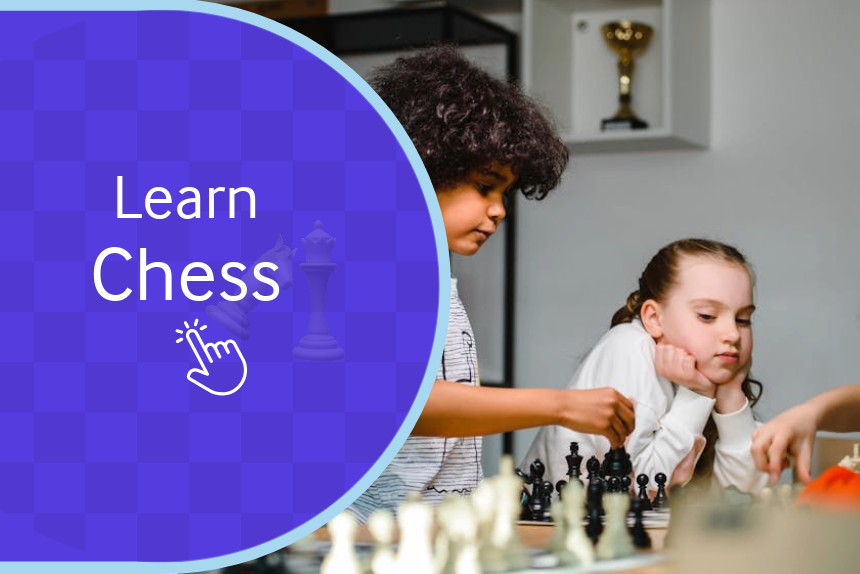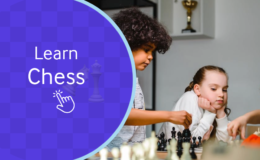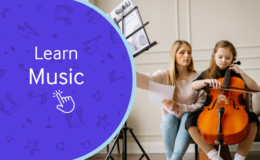
About Course
This basic course introduces young children (ages 6-10) to the fundamentals of chess. The focus is on understanding the game’s basic rules, movement of pieces, and simple strategies. The course is designed to be engaging, using interactive activities and games to make learning fun.
Course Duration
Weeks
8-
0
Session per Week
0
Minutes
30-
Week 1: Introduction to Chess
-
- Objective: Familiarize students with the chessboard and the names of the pieces.
- Content:
- Introduction to the chessboard (ranks, files, squares).
- Names and initial placement of chess pieces (pawn, rook, knight, bishop, queen, king).
- Basic understanding of the concept of turns.
- Activities:
- Chessboard drawing activity.
- Piece recognition game.
Week 2: Pawn Movement and Capturing
-
- Objective: Teach the movement and capturing rules for pawns.
- Content:
- Pawn movement: moving forward one square.
- Pawn capturing: diagonally one square.
- Special move: en passant (optional, if time permits).
- Activities:
- Simple pawn movement drills.
- Mini-games focusing on pawn movement and capturing.
Week 3: Rook and Bishop Movement
-
- Objective: Learn the movement and capturing rules for the rook and bishop.
- Content:
- Rook movement: moving horizontally and vertically.
- Bishop movement: moving diagonally.
- Activities:
- Rook and bishop movement exercises on an empty board.
- Capture the Flag game using only rooks and bishops.
Week 4: Knight and Queen Movement
-
- Objective: Understand the unique movement patterns of the knight and queen.
- Content:
- Knight movement: moving in an “L” shape.
- Queen movement: combining the rook and bishop movements.
- Activities:
- Knight maze challenge.
- Queen’s patrol game.
Week 5: King Movement and Check/Checkmate
-
- Objective: Introduce the king’s movement and the concepts of check and checkmate.
- Content:
- King movement: moving one square in any direction.
- Understanding check and checkmate.
- Activities:
- Practice scenarios with check and checkmate.
- “Save the King” game.
Week 6: Basic Opening Principles
-
- Objective: Teach the basic principles of opening play.
- Content:
- Controlling the center.
- Developing pieces.
- King safety (castling).
- Activities:
- Simulated games with emphasis on the opening.
- Discuss famous opening moves (e.g., Italian Opening).
Week 7: Simple Endgames
-
- Objective: Learn basic endgame strategies.
- Content:
- King and pawn vs. king.
- King and rook vs. king.
- The concept of stalemate.
- Activities:
- Endgame practice scenarios.
- “Last Man Standing” game.
Week 8: Review and Mini-Tournament
-
- Objective: Reinforce learned concepts through a fun and competitive environment.
- Content:
- Review key concepts from previous weeks.
- Conduct a mini-tournament with all students.
- Activities:
- Mini-tournament with awards or certificates.
- Review session and Q&A.
Materials Needed:
-
- Chessboards and pieces.
- Printed worksheets for activities.
- Rewards or certificates for participation.
Instructor Tips:
-
- Use simple language and visual aids to explain concepts.
- Keep the sessions interactive to maintain the children’s interest.
- Encourage questions and allow students to explore moves on their own.
This curriculum ensures that young children will have a solid foundation in chess by the end of the course, with plenty of opportunities for fun and engagement








